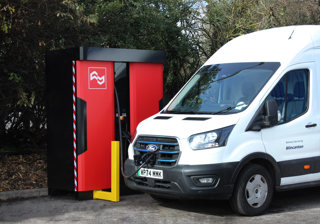The past 18 months have been a successful period for JCT600 Vehicle Leasing Solutions. It has seen its risk fleet size grow, its customer base expand by almost 20%, a 100% client retention rate for the second consecutive year and an increasing number of fleets move to sole supply. JCT600 VLS has also launched its £500,000 Origo customer platform, delivering multiple schemes or policies on a single system.
Its progress has been recognised by being named leasing company of the year (up to 20,000 vehicles) in this year’s Fleet News Awards.
Last year’s FN50 research showed JCT600 VLS had a risk fleet of 5,922 cars and vans, an increase of around 4% on the previous year.
And 2021’s research – due to be published next month – will show another increase, says Ben Creswick, managing director of JCT600 VLS.
This is due to a number of factors, but primarily the JCT600 VLS team, he adds.
“I sometimes talk about the four Ts – tech, team, trust and togetherness,” says Creswick.
“In this space you are up against big, bank-owned and private equity-owned leasing companies, so to even exist you have to have the best tech, you have to have data security, you have to have all the things they have, because otherwise you’d never get through a tender exercise.
The past 18 months have been a successful period for JCT600 Vehicle Leasing Solutions. It has seen its risk fleet size grow, its customer base expand by almost 20%, a 100% client retention rate for the second consecutive year and an increasing number of fleets move to sole supply. JCT600 VLS has also launched its £500,000 Origo customer platform, delivering multiple schemes or policies on a single system.
Its progress has been recognised by being named leasing company of the year (up to 20,000 vehicles) in this year’s Fleet News Awards.
Last year’s FN50 research showed JCT600 VLS had a risk fleet of 5,922 cars and vans, an increase of around 4% on the previous year.
And 2021’s research – due to be published next month – will show another increase, says Ben Creswick, managing director of JCT600 VLS.
This is due to a number of factors, but primarily the JCT600 VLS team, he adds.
“I sometimes talk about the four Ts – tech, team, trust and togetherness,” says Creswick.
“In this space you are up against big, bank-owned and private equity-owned leasing companies, so to even exist you have to have the best tech, you have to have data security, you have to have all the things they have, because otherwise you’d never get through a tender exercise.
“Trust is our lifeblood and we have the trust of our customers, while togetherness is being together as a group of people as an employee base, but it is also about how we work with our customers.
“However, the most important thing to me is our team. When you have a group of people that have the passion, the culture and desire we have, anything is possible because it creates a natural momentum.
“You should have seen how proud people were in the office that we won the Fleet News Award.These four things are really what we stand for.”
Q&A session
Fleet News: Where did the idea for Origo come from?
Ben Creswick: I had been away from fleet funding and management for three years before I joined JCT600 VLS in 2018 and I couldn’t believe how much had changed, with WLTP, OPRA, CAFE and this, that and the other: there were more acronyms than you could shake a stick at.
Should a fleet be taking EVs? Should a fleet offer salary sacrifice? What’s the impact of WLTP going to be and what happens if that legislation changes again? What’s the government incentivising? What about people who do big business mileage? There were so many things happening.
Even I was thinking, ‘What do you do? Do you stick your head in the sand and hope everything blows over, or is there something else?’ That was the turning point and where Origo, which is Latin for ‘the source’, came from.
It’s a bit like in The Matrix. When they want to know something, they go and see the Oracle and she has the answers. I thought it would be nice to have an Oracle that a customer could go to and get the information they need. I spoke to customers across the UK and they wanted something similar as well, so that’s what Origo was built for.
It was built as a modular system that could cater for pretty much any individual wanting to source a vehicle.
FN: How would a fleet customer use Origo?
BC: It takes around three months to implement it with a customer. We work with them to customise the platform to determine what the best funding options are for fleets.
Once those and a vehicle choice list have been determined, the drivers can go into the system to look at how different vehicles compare against different funding options.
Drivers can compare costs based on personal and business mileage, tax rate and vehicle preferences with the ability to adjust contracts and even fuel economy to give a realistic figure tailored to their own driving.
It’s been a big project getting this right. The right word is probably painstaking because the team meticulously went through every possible combination of everything.
FN: How are you helping fleets make the transition to electric vehicles?
BC: Consultancy is very important. You can push EVs as hard as you want, but if you’re pushing it to people who don’t want an EV, it isn’t going to work. You’ve got to listen to what the customer is trying to achieve as a corporate from a CSR perspective and in terms of reducing CO2.
A lot look at the headline rental, see that it’s more expensive and think it won’t work for them, but if you sit with them you can talk them through the process and the total cost of ownership.
Origo can help because by using the available data on drivers, such as mileage, average trip profiles, their tax rates and running costs, we can then advise on how to transition into an EV world.
We’ve done that with a lot of customers. Some are moving to 100% EV, but others are choosing different products for different employee populations because EV will not be right for every individual at the moment.
FN: You retained all of your customers in 2020 for the second consecutive year. How did you do that?
BC: At times a customer can suddenly become very clear about the benefits of dealing with someone like us.
I get that if a fleet wants to be part of a big leasing company, they know they are going to be one of many. But can they pick up the phone and speak to their account manager without going through to voicemail or call queuing, when they are really in trouble?
It’s at times like that where value comes into question, and when you’re tendering out there in this market, there’s sometimes a big difference between the price you pay and the value you get.
I think perhaps that’s where some of our customers’ mindsets move to. Some of those people who were operating multi-bid fleets have wanted to change that structure and we have seen an increase in the number of customers moving to sole supply with us.
FN: You also saw a number of old customers return to you in 2020. Why?
BC: At the end of the day, sometimes you will not be able to hold on to a client forever for whatever reason; their business may be taken over by a different company, for example. Those businesses will leave you, but the professionalism, respect and the service we give them as a departing client means the door stays open.
As they begin to experience life on the other side, they can immediately benchmark what the service is like, and it comes down to that value piece.
They will ring us and usually say, ‘Listen, do you fancy quoting us for a couple of vehicles?’ and that’s often the start of the return of them doing business with us.
Look after existing customers
Creswick expects to see JCT600 VLS grow further in the next 12 months, although he stresses it will be organic instead of chasing new business.
“I anticipate growth in the wider market, particularly because a lot of the people who took cash are now looking at alternative structures in terms of salary sacrifice for EV, or even just on a business contract hire structure, because the BIK is so minimal now,” he says.
“There will also be personal growth in terms of what we secure from a new business perspective.
“Some companies may want to charge around the country with field teams of salespeople and really want to aggressively push and grow, but that’s not what we are as a business.
“The one thing I’ve said to the team is that the most important thing is to look after our existing customers at all times and if we continue to do what we do today, then we will.
“It’s also about making sure that you are investing – in both internal and customer-facing systems – to keep delivering the best possible service we can at all times.”
Judges’ comments
Very customer-focused, with direct conversations and one-to-one relationships, JCT demonstrated its understanding of the marketplace today and the emerging trends, backed by lots of positive customer feedback. It clearly evidenced its outstanding support for fleets during Covid, including fiscal help.
Login to continue reading.
This article is premium content. To view, please register for free or sign in to read it.
























Login to comment
Comments
No comments have been made yet.